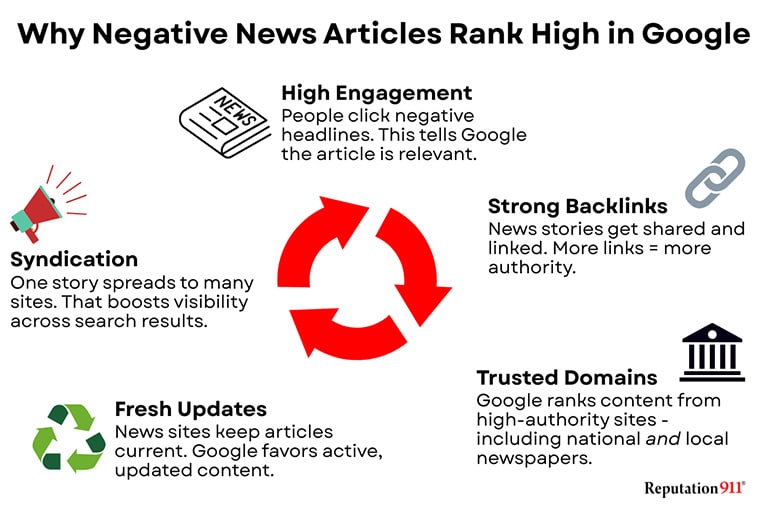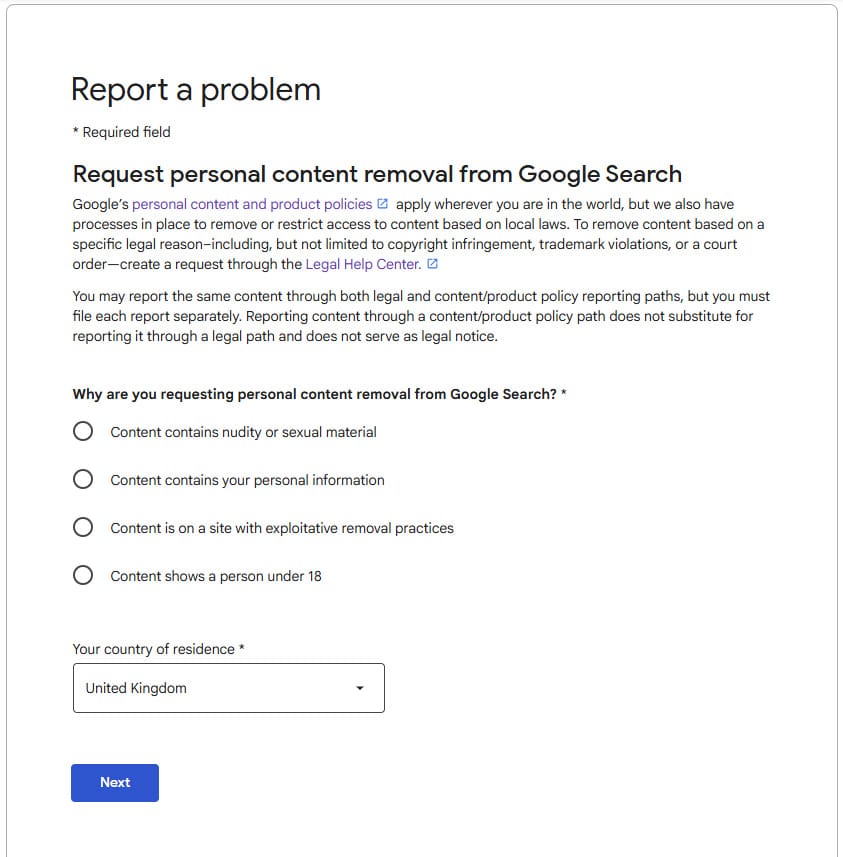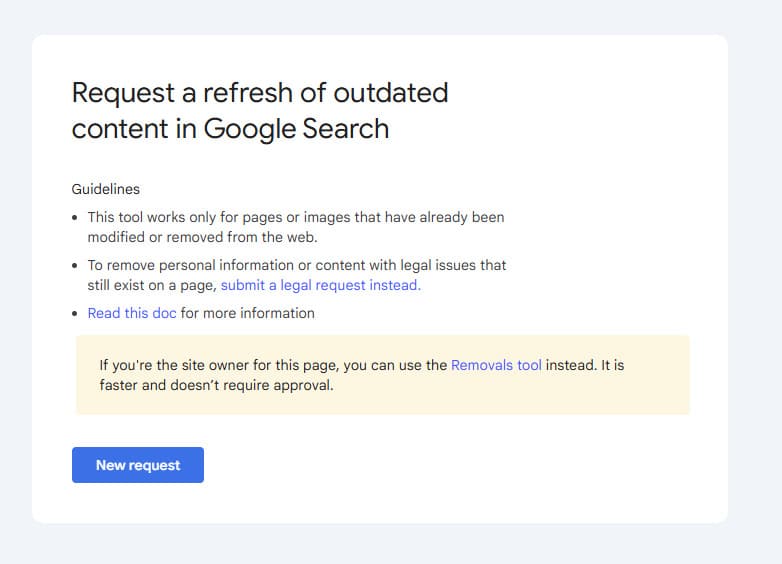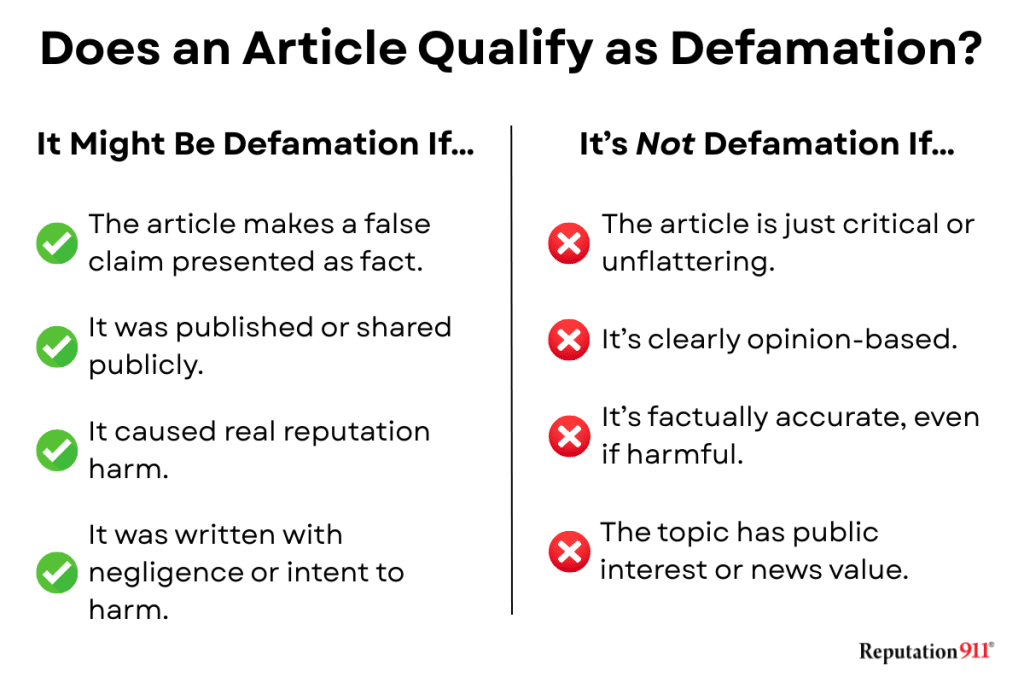Negative or unwanted news articles can quickly damage your reputation, leaving you feeling vulnerable when someone searches your name. Fortunately, there are actionable steps to remove harmful articles from Google search and reclaim control over how you or your business are perceived.
News spreads fact, but it rarely disappears as quickly from Google.
If a past article is still showing up in your search results, it can continue to harm your reputation long after the moment has passed. Whether it’s outdated, inaccurate, or just casting you or your business in a bad light, that coverage causes damage every time someone searches your name. Thankfully, there are steps you can take to remove negative news articles from Google search.
In this guide, you’ll learn how to deal with negative press online – from contacting publications to using Google tools to remove negative content, and even burying articles on search results you can’t delete it.
Negative articles include any piece of content written by a publication, journalist, or media outlet that could harm how others perceive you or your business.
They often appear on trusted news websites, giving them high visibility in Google search results. Once published, they can remain on the first page for years, even if the situation has long since changed.
Negative articles on the first page of Google can create lasting reputational damage when people like employers, clients, or business partners search for you. By getting rid of a negative news article in Google, you can protect your personal and professional image, ensuring online impressions reflect your character, rather than misleading or outdated information.
Whether the coverage is accurate or not, bad press can quickly cause widespread reputation damage.
Public perception shifts fast. Content like new stories, opinion pieces, and media mentions influence how people view you, your business, and your work.
Once negative coverage appears in Google search results, it can leave a bad first impression to potential employers, clients, or partners.
The experts at Reputation911 can help you remove negative press and news articles from Google search results.
When one negative article suddenly appears at the top of Google search results, it can be hard to shake. That’s not by accident, as Google’s algorithm favors showing news articles higher in search results for several reasons:

The result?
One single negative article can quickly turn into a web of related coverage that dominates the first page of Google – and sticks around much longer than it should.
Before taking any steps, you must identify where the article appears in search results. Search your full name, variations of your name, and any related keywords to see how the content is showing up in Google.
Then, check if the article has been linked or shared on social media. This can amplify its reach and keep it circulating.
Once you’ve found and documented where the article appears, use the strategies below to remove or get rid of the article from appearing high in search results for others to see:
The first step is to find find the article author, site editor, or another person that works for the publication to contact.
Check the news website for a contact page, or author bio page. If you can’t find anything, use tools like Hunter.io or LinkedIn to locate a journalist’s email address or newsroom contact details.
When you start writing your email, make sure to be polite, professional, and specific with your request. Explain in detail why the article should be removed and note the parts where it is either outdated, misleading, or no longer relevant.
Even if the article is factually accurate, you can still request changes if the story is:
If the article contains misinformation or factual errors, politely point them out. Back your claims with credible evidence or updated records.
If the article includes false statements that hurt your reputation, it may meet the legal threshold for defamation. In that case, a more urgent or formal request – possible through an attorney – might be appropriate (see Section 4: Legal Action).
There are three things you can ask the publisher to do:
Google won’t remove a news article from search results just because it’s negative – but there are a few tools that can help in specific situations.
Use this if the news article contains highly sensitive personal information, such as:
If the article includes any of this content, you can report a problem here.

You can use the Outdated Content Removal Tool if the article has already been deleted or updated at the source, but the old version still appears in search results.
This tool tells Google to refresh its index and remove the outdated page or snippet. Access the outdated content tool here.

While these tools won’t apply to most standard news stories, they’re worth checking if the article includes personal data or has already been taken down by the publisher.
If you can’t get a news article removed directly from Google, the next best option is to push it down in search results so fewer people see it. This approach is called search engine suppression.
When people search for something on Google, most never scroll past the first page of Google. By creating and promoting positive high-ranking content, you can move negative articles off page one – making them much less visible to anyone searching your name.
Publishing new blog posts, launching a personal website, optimizing your LinkedIn, and contributing to trusted platforms are just a few ways to do this. To learn more, check out our strategies to bury content on Google search results.
If a news article contains false statements presented as fact that harm your reputation, you may have a legal case for defamation. As a results, you may be able to pursue action to remove the content from Google.
Defamation refers to false published statements that damage a person’s character or credibility. In written form, this is called libel (as opposed to slander, which is spoken).

To qualify as defamation, the article must:
Simply being negative, unflattering, or critical does not meet the legal threshold. The statement must be demonstrably false and cause real reputational damage.
Because defamation law is complex and varies by state, it’s important to consult an experienced defamation attorney. A legal professional can:
Legal action should be a last resort. However, in cases of serious misinformation or reputational harm, it may be a necessary measure to set the record straight.
While you work on removing or burying a negative news article, how you respond in the meantime can make a big difference.
Taking the right steps early can reduce long-term damage and help you regain control over your reputation.
If a news story involves a real event or controversy, consider issuing a public response. A few ways to issue a statement could done as a statement on your website, blog, or social media. As you craft your statement, be honest, professional, and focused on the facts. Avoid being defensive, and don’t escalate the situation further.
When negative articles surface, you should have a clear crisis communication strategy already in place to respond to media inquiries, customer concerns, or online backlash. Designate a spokesperson (even if it’s just you) and stick to one consistent message across all platforms.
When bad press hits, you should use reputation monitoring tools like Google Alerts, Mention, or Brand24 to track new mentions of your name or business. Staying informed and up-to-date on the amount of mentions, and the sentiment of each new article published helps you respond quickly to new coverage or related content.
Bad press can feel overwhelming, but reacting to an unfavorable article emotionally can backfire. Instead, stay focused on your long-term reputation goals, and taking steps to clean up your online profile. Remember, every article removed or pushed down with the right plan in place.
Negative news coverage can have a lasting impact, but just know, you are not powerless. With the right strategy, it’s possible to reduce visibility of these articles across the internet, and in some cases, remove the articles entirely from Google search results.
Reputation911 offers expert content removal services to help you clean up your search results and take back control.
Yes, in many cases, Google does not remove legitimate news articles simply because they are unfavorable. Removal may be possible if the content violates Google’s policies, such as containing defamatory statements, outdated legal information, or personal data that qualifies for privacy protection.
Rarely. Google typically will not remove content that is factual, non-defamatory, and published by a legitimate news outlet—unless it includes sensitive personal data like home address, financial info, or explicit images.
If you would like to remove unwanted content that contains factual information, you should consider using search engine suppression.
Not automatically. Even if the article is deleted:
…may still exist. A complete removal strategy includes notifying these platforms or working to push them down in search results.
Negative content often ranks because:
If the publication won’t remove the article, a reputation management or content suppression plan can gradually push it down by creating and promoting positive, authoritative content that outranks it over time.
Each website is treated as a separate URL. So, in cases where an article is syndicated, you may need to:
Usually, but not always. Articles can reappear if:
Ongoing monitoring helps catch reappearance early.
If the article includes factual errors, you can request corrections from the publisher and submit a legal or policy-based removal request to Google with supporting evidence.